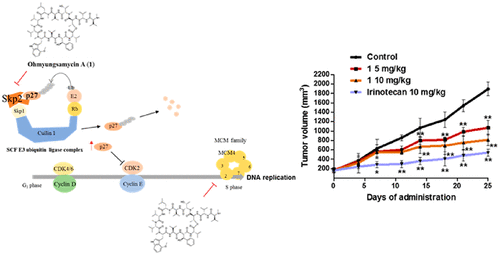当前位置:
X-MOL 学术
›
J. Nat. Prod.
›
论文详情
Our official English website, www.x-mol.net, welcomes your
feedback! (Note: you will need to create a separate account there.)
Antitumor Activity of Ohmyungsamycin A through the Regulation of the Skp2-p27 Axis and MCM4 in Human Colorectal Cancer Cells.
Journal of Natural Products ( IF 3.3 ) Pub Date : 2020-01-02 , DOI: 10.1021/acs.jnatprod.9b00918 Woong Sub Byun 1 , Sunghwa Kim 1 , Yern-Hyerk Shin 1 , Won Kyung Kim 1 , Dong-Chan Oh 1 , Sang Kook Lee 1
Journal of Natural Products ( IF 3.3 ) Pub Date : 2020-01-02 , DOI: 10.1021/acs.jnatprod.9b00918 Woong Sub Byun 1 , Sunghwa Kim 1 , Yern-Hyerk Shin 1 , Won Kyung Kim 1 , Dong-Chan Oh 1 , Sang Kook Lee 1
Affiliation

|
Ohmyungsamycin A (1), a novel cyclic peptide discovered from a marine Streptomyces sp., was previously reported with antibacterial and anticancer activities. However, the antitumor activities and the underlying molecular mechanisms of 1 remain to be elucidated. Compound 1 inhibited the proliferation and tumor growth of HCT116 human colorectal cancer cells based on both in vitro cell cultures and an in vivo animal model. A cDNA microarray analysis revealed that 1 downregulated genes involved in cell cycle checkpoint control. Compound 1 also induced G0/G1 cell cycle arrest that was mediated by the regulation of S-phase kinase-associated protein 2 (Skp2)-p27 axis and minichromosome maintenance protein 4 (MCM4). Furthermore, a longer exposure of 1 exhibited an accumulation of a sub-G1 phase cell population, which is characteristic of apoptotic cells. The induction of apoptosis by 1 was also associated with the modulation of caspase family proteins. Compound 1 effectively suppressed tumor growth in a xenograft mouse model subcutaneously implanted with HCT116 cells. In addition, analysis of tumors revealed that 1 upregulated the expression of the CDK inhibitor p27 but downregulated the expression of Skp2 and MCM4. These findings demonstrate the involvement of 1 in cell cycle regulation and the induction of apoptosis in human colorectal cancer cells.
中文翻译:

Ohmyungsamycin A通过调节人类结直肠癌细胞中Skp2-p27轴和MCM4的抗肿瘤活性。
Ohmyungsamycin A(1)是一种从海洋链霉菌属(Streptomyces sp。)中发现的新型环状肽,以前被报道具有抗菌和抗癌活性。然而,1的抗肿瘤活性和潜在的分子机制仍有待阐明。基于体外细胞培养和体内动物模型,化合物1抑制HCT116人结肠直肠癌细胞的增殖和肿瘤生长。cDNA微阵列分析显示1个下调的基因参与细胞周期检查点控制。化合物1还诱导了G0 / G1细胞周期停滞,这是由S期激酶相关蛋白2(Skp2)-p27轴和微染色体维持蛋白4(MCM4)的调节介导的。此外,更长的暴露时间1表现出亚G1期细胞群的积累,这是凋亡细胞的特征。1诱导的细胞凋亡也与胱天蛋白酶家族蛋白的调节有关。在皮下植入了HCT116细胞的异种移植小鼠模型中,化合物1有效地抑制了肿瘤的生长。此外,对肿瘤的分析显示1上调CDK抑制剂p27的表达,但下调Skp2和MCM4的表达。这些发现证明1参与人结肠直肠癌细胞的细胞周期调节和细胞凋亡的诱导。肿瘤分析显示1上调CDK抑制剂p27的表达,但下调Skp2和MCM4的表达。这些发现证明1参与人结肠直肠癌细胞的细胞周期调节和细胞凋亡的诱导。肿瘤分析显示1上调CDK抑制剂p27的表达,但下调Skp2和MCM4的表达。这些发现证明1参与人结肠直肠癌细胞的细胞周期调节和细胞凋亡的诱导。
更新日期:2020-01-02
中文翻译:

Ohmyungsamycin A通过调节人类结直肠癌细胞中Skp2-p27轴和MCM4的抗肿瘤活性。
Ohmyungsamycin A(1)是一种从海洋链霉菌属(Streptomyces sp。)中发现的新型环状肽,以前被报道具有抗菌和抗癌活性。然而,1的抗肿瘤活性和潜在的分子机制仍有待阐明。基于体外细胞培养和体内动物模型,化合物1抑制HCT116人结肠直肠癌细胞的增殖和肿瘤生长。cDNA微阵列分析显示1个下调的基因参与细胞周期检查点控制。化合物1还诱导了G0 / G1细胞周期停滞,这是由S期激酶相关蛋白2(Skp2)-p27轴和微染色体维持蛋白4(MCM4)的调节介导的。此外,更长的暴露时间1表现出亚G1期细胞群的积累,这是凋亡细胞的特征。1诱导的细胞凋亡也与胱天蛋白酶家族蛋白的调节有关。在皮下植入了HCT116细胞的异种移植小鼠模型中,化合物1有效地抑制了肿瘤的生长。此外,对肿瘤的分析显示1上调CDK抑制剂p27的表达,但下调Skp2和MCM4的表达。这些发现证明1参与人结肠直肠癌细胞的细胞周期调节和细胞凋亡的诱导。肿瘤分析显示1上调CDK抑制剂p27的表达,但下调Skp2和MCM4的表达。这些发现证明1参与人结肠直肠癌细胞的细胞周期调节和细胞凋亡的诱导。肿瘤分析显示1上调CDK抑制剂p27的表达,但下调Skp2和MCM4的表达。这些发现证明1参与人结肠直肠癌细胞的细胞周期调节和细胞凋亡的诱导。











































 京公网安备 11010802027423号
京公网安备 11010802027423号